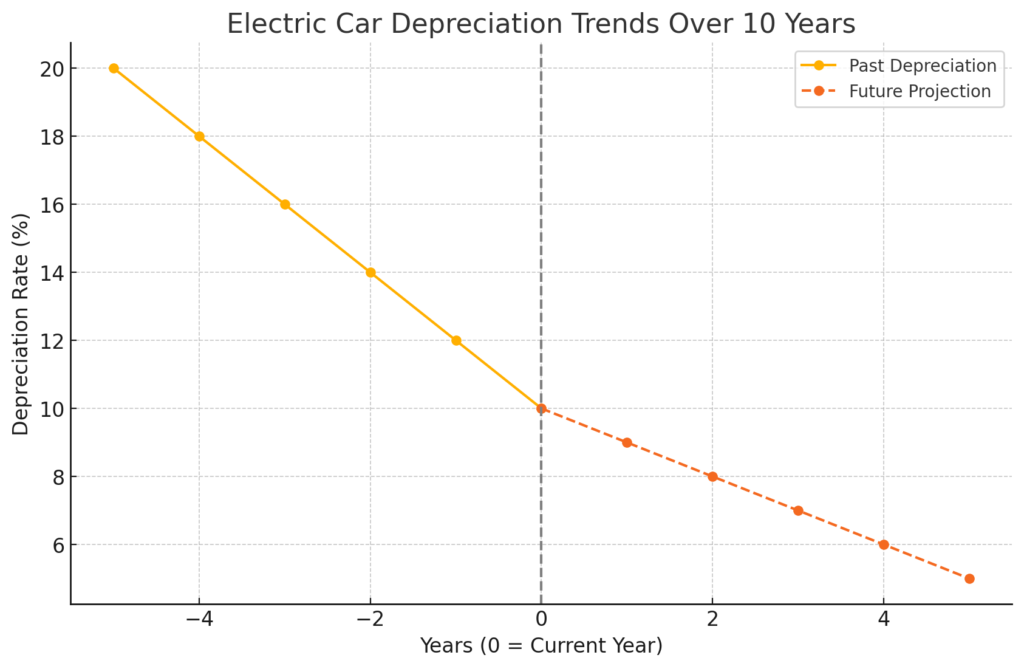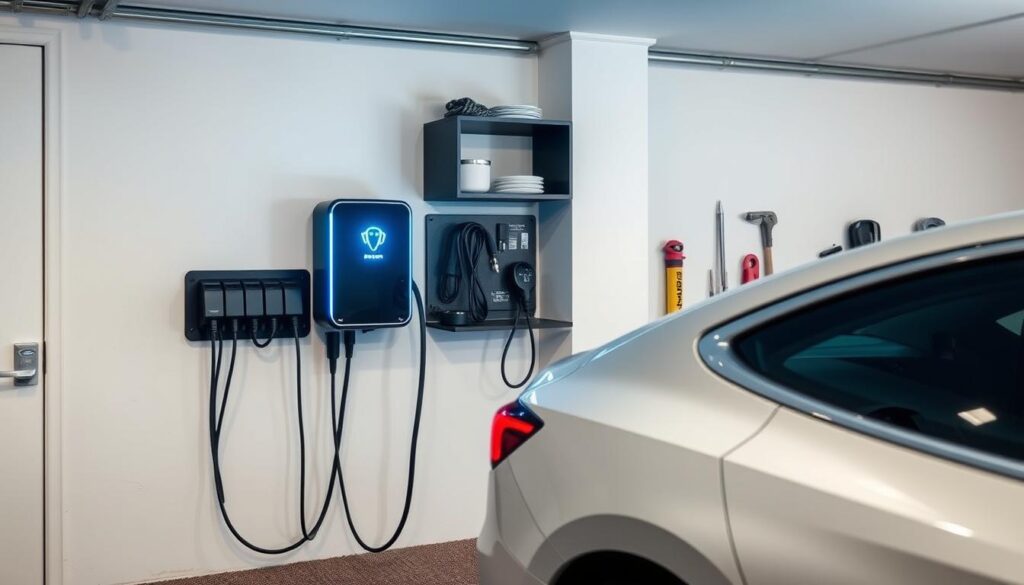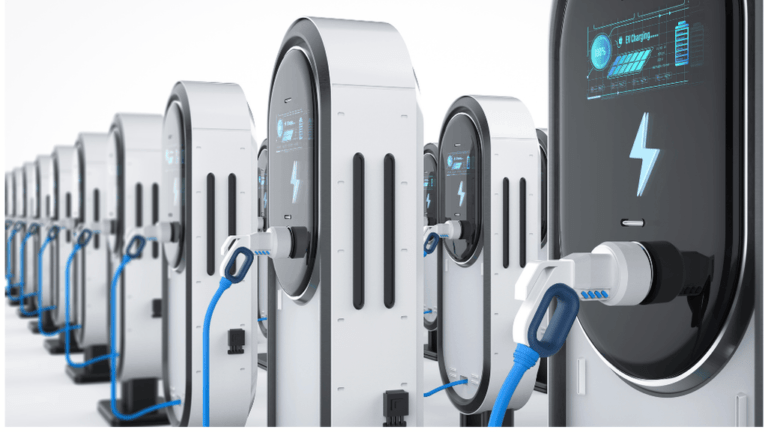Buying an electric car comes with both savings and extra costs. It’s not just about the sticker price. You need to look at charging, maintenance, and insurance costs too. These costs can be compared to the savings on fuel, which can be a big plus.
Electric cars like the Tesla Model 3 are getting more popular, even though they cost about $60,000. People like them because they’re good for the planet and can save money on fuel. As gas prices go up and down, electric cars offer a steady, lower cost for fuel.
But, owning an electric car has its downsides. Things like depreciation and possibly replacing the battery pack can add up. Still, EV drivers might save up to 60% a year on fuel compared to cars with traditional engines. With lower maintenance costs and government help, the upfront cost can be easier to handle. Yet, the cost of electricity and insurance can vary by state, making it a personal choice for buyers.
Key Takeaways
- The Tesla Model 3, a popular choice among EVs, comes with a hefty initial cost, yet promises economic benefits via fuel savings.
- Battery replacement adds a unique factor to the depreciation of electric vehicles, challenging their long-term value proposition.
- Electricity costs for charging an EV can vary greatly by location, influencing the overall affordability of electric car ownership.
- Government incentives and tax credits may help reduce the out-of-pocket expenses associated with purchasing an EV.
- Premium brands of EVs can command an average sale price significantly higher than the industry average.
- Owing to reduced maintenance requirements, electric vehicles potentially offer lower long-term operational costs than traditional gasoline vehicles.
- Prospective buyers are advised to consider models with a proven market history and generous warranties to increase reliability and mitigate unforeseen expenses.
Initial Purchase Price and Affordability of Electric Vehicles
Many people worry about the cost of electric vehicles, especially the initial price compared to gas cars. Let’s look into the costs and incentives that affect owning an electric car.
Comparing the Price Tags: EVs versus Conventional Cars
Electric vehicles used to be more expensive than gas cars. But now, the difference is getting smaller. The average price for a new electric car is $54,021, which is 9.7% less than last year. This makes electric cars more affordable.
Plus, you can save money with federal tax incentives. You could get up to $7,500 for a new electric car or $4,000 for a used one. This makes them a good choice for those who care about the environment. For more info, check out Electric Vehicle Next Gen.
Calculating Break-Even Points with Electric Cars
It’s important to figure out when owning an electric car pays off. Electric cars cost less to run, which means big savings on fuel and maintenance. For example, fueling an electric car costs about $485 a year, much less than gas cars at $1,117.
EVs also cost half as much to maintain as gas cars. This means more savings over time. These savings help electric cars pay for themselves faster.
Choosing electric cars also helps the environment. The cost of carbon emissions is about $190 per ton, says the U.S. Environmental Protection Agency. By using electric cars, owners help reduce these costs and save money indirectly by protecting the environment.
In conclusion, electric cars may cost more at first, but they save money on fuel, maintenance, and environmental costs over time. Switching to electric cars is a smart choice for saving money and living sustainably.
Long-Term Cost Benefits of Electric Car Ownership
Looking into the long-term costs of owning an electric car shows big savings. These savings can make up for the higher initial cost. Over time, electric cars save money on fuel and maintenance.
Savings on Fuel: The Cost of Electricity vs. Gasoline
Electric vehicles (EVs) are great because they cut fuel costs a lot. EVs use much less energy than cars with gasoline. For example, EVs can go over 130 miles on just 25–40 kWh of energy.
This means EV drivers spend 40 to 65 percent less on fuel each year. This is a big difference compared to driving a car with a gas engine.
Reduced Expenses in Electric Car Maintenance and Repairs
EVs also cost less to maintain and repair. They have fewer parts that can break, so they need less upkeep. This means EVs need about 30 percent less maintenance than cars with gasoline engines.
This leads to a 40 percent drop in yearly maintenance costs. It helps save money and keeps the car running more often.
| Expense Category | Electric Vehicle (EV) | Gasoline Vehicle |
|---|---|---|
| Annual Fuel Cost* | $546 | $1,255 |
| Annual Maintenance Cost* | $330 | $660 |
| Long-term Savings Over 7 Years | $10,581 | $3,000 |
*Costs estimated based on average vehicle operation of 15,000 miles per year.
The price of EVs is getting lower, dropping by nearly $15,000 in just a year. With big savings on fuel and maintenance, EVs are a smart choice for the long run. Plus, there are now over 53,000 public charging stations, making EVs easier to own.
So, EVs are not just good for the planet but also for your wallet. The savings and easy access to charging make them a great option for more families in America.
Cost of Owning an Electric Car: Beyond the Sticker Price
Looking at the true cost of owning an electric car means more than just the sticker price. You need to think about battery replacement and depreciation too. These can greatly affect the cost over time. Consumer Reports says electric car maintenance costs are 50% lower than traditional cars. This shows you can save money in the long run, even if it costs more to buy one.
Depreciation is also key. Electric cars can lose value faster than some gas cars, which adds to the cost. But buying used electric cars can help lower these costs. This makes owning an electric car less expensive overall.
| Cost Factor | Electric Car | Conventional Car |
|---|---|---|
| Initial Purchase Price | Higher with incentives | Lower |
| Maintenance & Repairs | 50% lower costs | Higher costs |
| Energy Costs | 60% savings on fuel | Higher fuel costs |
| Depreciation | Higher initial rate | Varies by brand |
Electric cars save a lot of money over time, thanks to lower maintenance and energy costs. EVs have fewer parts than gas cars, which means less wear and tear. Plus, you can save about 60% on fuel costs.
To really get the full picture of owning an electric car, look at the tax incentives available here. These incentives can help cover the cost of EVs and charging stations. State and federal incentives can also make electric cars more affordable for more people.
Experts like Forhad at EV Next Gen talk about more than just cost benefits. They highlight how electric vehicles are better for the planet and are becoming more popular as people choose greener options.
Understanding the true cost of owning an electric car means looking at both immediate and long-term costs. EVs may cost more upfront, but you save on fuel and maintenance. Add in tax incentives and environmental benefits, and electric cars become a strong choice.
Financial Incentives and Tax Credits for Electric Vehicle Buyers
It’s key to know about financial incentives and tax credits when looking at electric car ownership costs. Federal and state incentives can cut down the initial and ongoing electric vehicle ownership expenses. This makes electric vehicles more affordable and appealing.
The Impact of Federal and State EV Incentives on Total Cost
Big upfront cost reductions come from federal and state EV incentives. A federal tax credit of up to $7,500 for new electric vehicles is a big help. Plus, state and local incentives can lower costs even more. This makes buying an electric vehicle more attractive. Specific financial incentives depend on the vehicle’s battery size and other factors.
How Rebates and Tax Breaks Lower Out-of-Pocket Expenses
Rebates and tax breaks are key in cutting down electric vehicle ownership expenses. They make the initial investment lighter. When you add these incentives to the purchase, electric vehicles can be priced better than traditional ones. They might even offer a lower total cost over time, considering savings on fuel and maintenance.
| Incentive | Credit Value | Eligibility Requirements |
|---|---|---|
| Federal Tax Credit (New EV) | Up to $7,500 | Battery capacity of at least 7 kWh; Final assembly in North America |
| Federal Tax Credit (Used EV) | Up to $4,000 | At least 2 years old; Less than $25,000; Below qualifying income thresholds |
| State Rebates | Varies | Depends on state; Often extra incentives for low-income buyers |
| Home Charger Tax Credit | Up to $1,000 | Installed in a residence; Meets energy efficiency criteria |
These incentives greatly help with the concerns about electric car ownership costs. Buyers should think about these incentives when planning their purchase. They make owning an electric vehicle a smart choice for both the environment and your wallet.
Cost Analysis: Electric Car Depreciation Rates
Depreciation is a big part of the cost when owning an electric car. Even though electric vehicles (EVs) are pricier at first, they’re getting more popular. Knowing how they lose value is key for comparing electric car costs.
Studies show electric cars lose value faster than cars with traditional engines. For example, luxury models like the Mercedes-Benz EQS and Tesla drop in value by more than half soon after buying. This quick loss in value can change the total cost of owning a car and is something buyers should think about.
Understanding EV Resale Value Over Time
EV resale values are looking mixed. Some models like the Tesla Model Y and the Nissan Leaf S hold their value well. But others lose value quickly. This is because EV technology changes fast, making older models seem outdated compared to traditional cars.
A study by Vincentric shows that 19 out of 41 EV models can pay for themselves in seven years, beating similar gas cars. Some even offer savings right away. For more info on this electric car depreciation guide.
Comparing Depreciation: Electric Cars versus Gas-Powered Models
Only 10 out of 41 EVs depreciate less than similar gas cars. This shows buyers should look closely at specific models before buying. Over time, electric cars often cost less to own, thanks to lower running and maintenance costs.
This complex situation with car depreciation shows why it’s important to compare electric car costs carefully. It helps us understand the long-term money side of driving an eco-friendly car.
The True Cost of Recharging: At Home and Public Stations
Understanding the cost of owning an electric car is more than just buying and maintaining it. It’s about looking at the electric car charging expenses. These costs differ between charging at home and in public places. This affects how affordable and practical it is to own an electric car.
Home Charging Setups and Their Upfront Costs
About 80% of EV owners charge their cars at home. This choice is smart because charging at home is usually cheaper than at public stations. The cost of electricity varies by state, from $0.11 to $0.31 per kWh. This means charging an electric car can cost between $11 and $41 per 100 kWh a month.
Installing a Level 2 charger at home can cost $1,000 to $3,000. This includes upgrades like an electric panel if needed.
Public Charging Station Fees and Their Impact on Overall Costs
Public charging stations, on the other hand, are often more expensive. They can triple the cost of charging compared to at home. Level 2 chargers at public spots might cost $1 to $5 per hour to use. DC charging can be even pricier, with 20-30 minutes costing $10 to $30.
Some chargers, like Tesla’s, charge 50 cents per minute if you stay plugged in after charging. This can add up quickly.
Comparative Cost Table for At-Home vs Public Charging (Per Year)
| Type of Charging | Cost Range Per Year | Savings vs. Gasoline Vehicle |
|---|---|---|
| At-Home Charging | $506 – $720 | $950 annually |
| Public Level 2 Charging | $770 – $963 | $1,227 annually |
Managing the cost of owning an electric car, especially charging costs, can seem tough. But, the savings on fuel, which can be $950 to several thousand dollars over the car’s life, make electric cars a good long-term choice.
Projected Maintenance and Repair Costs for EVs
The world of electric vehicles (EVs) is changing the way we drive and think about car costs. EVs save a lot on maintenance and repairs compared to traditional cars. This is because they have fewer parts and work more simply.
Knowing the differences in service costs helps people decide if an EV is right for them. For more info, check out the article titled “Understanding the Cost of Owning an Electric.
Comparing Service Expenses: Electric vs. Gas Vehicles
EVs have fewer parts than gas cars, which means they need less maintenance. On average, EVs save about $330 a year on upkeep compared to gas cars. They don’t need oil changes, fuel filters, spark plugs, or emission checks.
EV Battery Longevity and Replacement Costs
The battery is key to an EV’s life and performance. Most EV batteries last 10 years or up to 2,000 charges. If a battery needs replacing, it can cost $5,000 to $20,000, depending on the car. Many car makers offer long warranties on batteries, so replacement costs are often far off.
| Vehicle Model | 5-year Maintenance Cost | Comparison with Gas Model |
|---|---|---|
| Chevrolet Bolt EUV | $2,885 | Chevrolet Trax SUV $4,411 |
| Audi Q4 e-tron | $3,136 | Audi Q5 $5,226 |
| Porsche Taycan Cross Turismo Turbo S | $12,269 | Higher-end ICE models vary |
These numbers show that EVs are cheaper to maintain than gas cars. EVs offer yearly savings and long-term benefits. This makes owning an EV a smart financial choice.
Insuring an Electric Car: Evaluating the Insurance Costs
When looking into electric vehicle costs, it’s important to think about insurance. Insurance for electric cars is usually more expensive than for gas cars. This is because electric vehicles have advanced technology and cost more, like the Tesla Model Y and Model 3.
But, the car industry is changing, which might affect insurance prices. With more EVs expected to hit the roads in 2024, insurance companies might offer better deals. In the past, insurance claims for EVs and traditional cars were similar. This shows that insurance costs might become more balanced.
Some companies like Geico and State Farm are already offering discounts of up to 10% for EVs. This suggests that insurance costs for electric cars could become more like those for traditional cars.
However, electric car owners need to be careful when choosing insurance. Things like the cost of fixing EVs and the price of parts, like the battery, affect insurance rates. Some companies offer special benefits for EVs, making it important to compare insurance options carefully.
Insurance costs for electric cars are closely tied to owning one. Finding affordable insurance requires careful research and understanding of your car’s needs.
FAQ
What encompasses the electric car ownership costs?
How do the price tags of EVs compare to conventional cars?
How can you calculate the break-even point with an electric car?
What are the savings on fuel when driving an electric car?
FAQ
What encompasses the electric car ownership costs?
Owning an electric car includes the cost of buying it, charging it, maintaining it, insuring it, and possibly replacing the battery later. These costs add up over the car’s life.
How do the price tags of EVs compare to conventional cars?
EVs usually cost more to buy than traditional cars. For example, a Tesla Model 3 is pricier than a similar gas-powered car.
How can you calculate the break-even point with an electric car?
To find the break-even point, compare the electric and gas car prices. Add in the cost of electricity versus gasoline, maintenance savings, and tax credits. If the savings add up, you’ll break even eventually.
What are the savings on fuel when driving an electric car?
Electric cars are cheaper to run. For instance, driving 15,000 miles a year costs about $546 on electricity. Gas cars would cost $1,255.
Are there reduced expenses in electric car maintenance and repairs?
Yes, electric cars have fewer parts to maintain and no need for oil changes or air filter replacements. This means lower repair costs.
How does battery replacement impact the true cost of owning an electric car?
Replacing the battery is a big expense, costing around $10,000 or more. But, it’s not a common need, depending on the battery’s life.
How do federal and state EV incentives affect the total cost?
Incentives from the government and states can lower the upfront cost of an electric car. This makes them more affordable.
Can rebates and tax breaks significantly lower out-of-pocket expenses?
Yes, rebates and tax breaks can greatly reduce the cost of electric vehicles. This helps offset the higher initial prices.
What is important to understand about EV resale value over time?
EVs can lose value faster than gas cars. Knowing how much an EV will keep its value is key when buying one.
How does the depreciation of electric cars compare to gas-powered models?
Electric cars often lose value quicker than gas cars. For example, a Tesla might lose its value faster than a Subaru.
What should you consider about home charging setups and their upfront costs?
Setting up charging at home costs money upfront. This includes buying and installing equipment like a 240-volt outlet or a Level 2 charger.
How do public charging station fees affect overall electric vehicle costs?
Public charging stations charge different prices, like by kilowatt-hour or per minute. These fees add to the cost of owning an electric car.
How do service expenses for electric vehicles compare to gas vehicles?
EVs cost less to maintain because they have fewer parts. But, they may have specific costs like battery care or tire replacement.
What should you know about EV battery longevity and replacement costs?
Batteries in electric cars don’t need replacing often, but it’s expensive when they do. Most car makers offer long warranties for the battery to help with costs.
How do insurance costs for electric vehicles compare to conventional ones?
Insurance for electric cars might be higher because they’re more expensive and need special repairs. But, as more people buy them, insurance rates should get more competitive.
,255.
Are there reduced expenses in electric car maintenance and repairs?
Yes, electric cars have fewer parts to maintain and no need for oil changes or air filter replacements. This means lower repair costs.
How does battery replacement impact the true cost of owning an electric car?
Replacing the battery is a big expense, costing around ,000 or more. But, it’s not a common need, depending on the battery’s life.
How do federal and state EV incentives affect the total cost?
Incentives from the government and states can lower the upfront cost of an electric car. This makes them more affordable.
Can rebates and tax breaks significantly lower out-of-pocket expenses?
Yes, rebates and tax breaks can greatly reduce the cost of electric vehicles. This helps offset the higher initial prices.
What is important to understand about EV resale value over time?
EVs can lose value faster than gas cars. Knowing how much an EV will keep its value is key when buying one.
How does the depreciation of electric cars compare to gas-powered models?
Electric cars often lose value quicker than gas cars. For example, a Tesla might lose its value faster than a Subaru.
What should you consider about home charging setups and their upfront costs?
Setting up charging at home costs money upfront. This includes buying and installing equipment like a 240-volt outlet or a Level 2 charger.
How do public charging station fees affect overall electric vehicle costs?
Public charging stations charge different prices, like by kilowatt-hour or per minute. These fees add to the cost of owning an electric car.
How do service expenses for electric vehicles compare to gas vehicles?
EVs cost less to maintain because they have fewer parts. But, they may have specific costs like battery care or tire replacement.
What should you know about EV battery longevity and replacement costs?
Batteries in electric cars don’t need replacing often, but it’s expensive when they do. Most car makers offer long warranties for the battery to help with costs.
How do insurance costs for electric vehicles compare to conventional ones?
Insurance for electric cars might be higher because they’re more expensive and need special repairs. But, as more people buy them, insurance rates should get more competitive.










